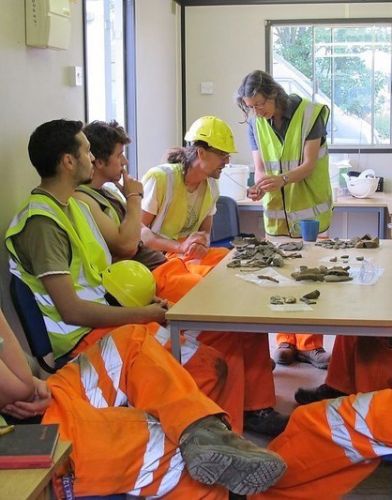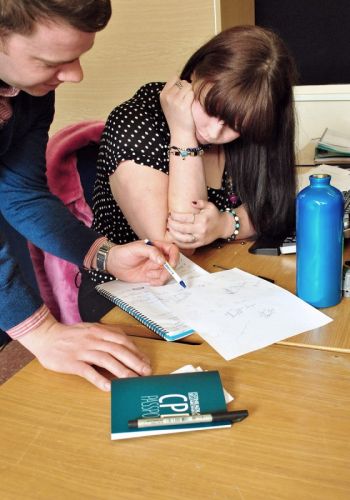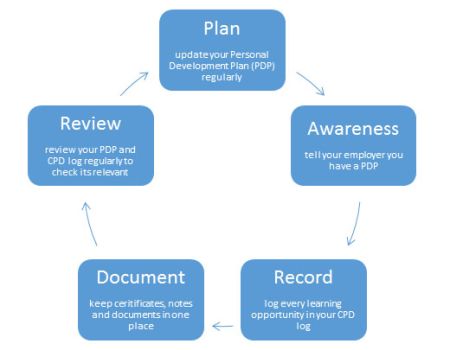Continuing Professional Development (CPD) allows individuals to develop their skills and knowledge throughout their working lives. It is an ongoing process which may be related to your current job role, future professional aspirations or more personal goals and objectives. Sharing knowledge about professional archaeology improves standards, promotes best practice and attracts new people into archaeology.

This page gives you an overview of our CPD requirements for members, how to set out your Personal Development Plan (PDP) and how to identify and record relevant training. CIfA members also have free access to our e-guidance module where you can find more information. We also have an FAQs page to assist.
CPD requirements for CIfA accredited archaeologists
CIfA champions professionalism in archaeology. Our overall goal is for clients to engage only accredited professionals with the necessary skills to carry out archaeological services. To achieve this it is critical that our accredited archaeologists engage with continuing professional development.
As a CIfA accredited archaeologist, you should ensure that you have the appropriate skills and knowledge for the archaeological work you do and to keep those skills up to date. All individual accredited archaeologists must:
- complete at least 50 hours of CPD every two years
- have a personal development plan (PDP)
- record all their CPD in a CPD log - CIfA members can use an online CPD log to record their CPD and learning objectives or upload their own forms.
Personal Development Plans (PDP)

Your PDP outlines personal and professional learning targets for the next two years. It should include:
- your learning goals for the next two years
- where you might be able to acquire these skills and who can help
You can add these to the online CPD record or download and use the Personal Development Plan (PDP) proforma or your employers' version. An example PDP is also available below.
Additional guidance can be found in the article Taking control of your future: making the most of opportunities to expand your career horizons from The Archaeologist, issue 107.
CPD log
Your CPD log is for recording your CPD activity and can be used as evidence of your achievements and help support an upgrade application. You can include any activities on your CPD log which help you achieve the learning goals outlined in your PDP.
You can add these to your online CPD record (CIfA members only) or download and use the following CPD record proforma or your employers' version.
We also encourage you to reflect on what you have learnt, how this will impact your professional practice or work in the future, and if there is scope for further development. There are reflection questions at the end of the proforma and in the online CPD log (CIfA members only). The University of Cambridge has some useful reflection models that may help.
What counts as CPD?
We believe in self-directed CPD. This means you choose the form of training or learning that relates to your overall goals set out in your PDP. For example, if you attend a two-day conference but only a one hour session is directly relevant to your PDP, you should only record that session in your CPD log. Some types of CPD you can include are listed below.
- home-based learning
- work-based learning
- in-house training courses
- external training courses
- preparatory research and reading
- conferences or workshops
- formal research
Five tips for supporting your own professional development

- Plan – think about and update your Personal Development Plan (PDP) regularly (we recommend every six months)
- Awareness – make sure your employer is aware you have a PDP, take it along to your next appraisal. If you are self-employed, you will need to act as both employer and employee... even more important to add to your diary!
- Record – ensure you record every learning opportunity you take in a CPD log. We have a template for this but you can use anything – a diary, spreadsheet, notebook – there are also apps available for smart phones and tablets, and CIfA members can use our online CPD form in the [members area](/online-cpd-log)
- Review – establish a regular review cycle of your PDP and CPD to make sure they are up to date and relevant... or maybe ask an individual in a similar situation so you can help each other
- Document – it is useful to keep any certificates together in case someone asks to see them - and retain the course documentation and notes so you can keep using them.
CPD diaries
Responsibility for your professional development lies with you, although other people including employers, colleagues and CIfA will be able to help along the way. To read members’ accounts of their experiences of CPD take a look at CIfA CPD diaries.

